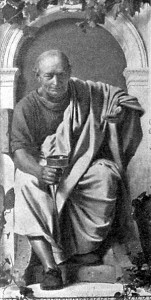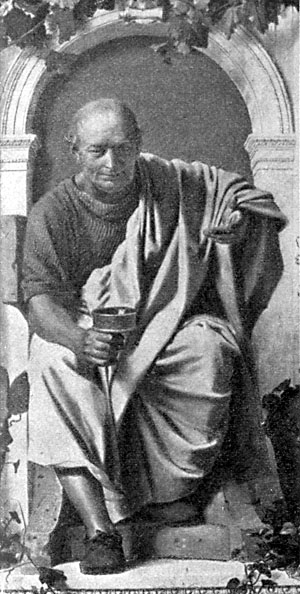“Epicurean Analysis” By Peter St. Andre
 It is very helpful to me as a student of Epicurus to read the writings of other students of Epicurus and to see what they find interesting. That shouldn’t be surprising, given that Epicurus himself recommended that his students study his ideas and compare notes: “Exercise yourself in these and related precepts day and night, both by yourself and with one who is like-minded; then never, either in waking or in dream, will you be disturbed, but will live as a god among men.” (Letter to Menoeceus)
It is very helpful to me as a student of Epicurus to read the writings of other students of Epicurus and to see what they find interesting. That shouldn’t be surprising, given that Epicurus himself recommended that his students study his ideas and compare notes: “Exercise yourself in these and related precepts day and night, both by yourself and with one who is like-minded; then never, either in waking or in dream, will you be disturbed, but will live as a god among men.” (Letter to Menoeceus)
I recently learned of two new posts from Peter St. Andre, the first entitled “Epicurean Analysis” and posted on February 24th. In this blog post, Peter points out that Epicurus provided us what amounts to an unified theory for analyzing the vices of envy, anger, desire for power, fame, honor, and luxury. I encourage you to read his full post, so I won’t quote it all here, but the end result is the observation that, “according to Epicurus, a “vice” or “sin” is a pattern of thought and behavior that is driven by a specific fear and that leads to an unnatural or unnecessary desire, thus taking you off the path to happiness.”
I agree with each and every one of his examples, but let me quote only one and offer a couple of observations. Here’s Peter’s last example: “The fear of failure leads to laziness — the desire to get something for nothing. Yet the ideal is not passivity but active confidence in your abilities and the pursuit of self-improvement.”
I particularly like this one because of my current focus on self-improvement as a core Epicurean principle, applied by Thomas Jefferson’s famous letter to William Short of October 1, 1819, as:
I take the liberty of observing that you are not a true disciple of our master Epicurus, in indulging the indolence to which you say you are yielding. One of his canons, you know, was that “the indulgence which prevents a greater pleasure, or produces a greater pain, is to be avoided.” Your love of repose will lead, in its progress, to a suspension of healthy exercise, a relaxation of mind, an indifference to everything around you, and finally to a debility of body, and hebetude of mind, the farthest of all things from the happiness which the well-regulated indulgences of Epicurus ensure; fortitude, you know, is one of his four cardinal virtues. That teaches us to meet and surmount difficulties; not to fly from them, like cowards; and to fly, too, in vain, for they will meet and arrest us at every turn of our road. Weigh this matter well; brace yourself up….
Another comment I want to make is about Peter’s use of the word “ideal” in each of his formulations. I continue to think is critical is that we identify words such as “ideal” as clearly referring back directly to the standard provided by Nature, and not to any other standard. Nature provides to us evidence about the world around us through the five senses, through the anticipations, and also through pleasure and pain. But it is according to Nature’s ultimate goal for all living creatures, achievement of a full and happy life, by which we judge the probable result of our response to the evidence, and then act accordingly.
And how do we know that “achieving a full and happy life” is Nature’s goal for all living creatures? Did “god” tell us that through divine revelation? Did “reason” tell us that by looking at circles and triangles? Nope – neither Platonic “reason” nor Divine revelation are our guides. Nature is our guide, and we observe that a full life of happiness is the goal throughout the living world. Without the three-cornered stool of sensing faculties which Nature provides to us, we could not reason ourselves out of a paper bag. We observe the evidence that supports all our most important conclusions in life, in the way that Cicero’s Epicurean speaker described:
“Epicurus sets out to show this as follows: Every living thing, as soon as it is born, seeks after pleasure, and delights in it as its chief good. It also recoils from pain as its chief evil, and avoids pain so far as is possible. Nature’s own unbiased and honest judgment leads every living thing to do this from birth, and it continues to do this as long as it remains uncorrupted. Epicurus refuses to admit any need for discussion to prove that pleasure is to be desired and pain is to be avoided, because these facts, he thinks, are perceived by the senses, in the same way that fire is hot, snow is white, and honey is sweet. None of these things need be proved by elaborate argument — it is enough merely to draw attention to them. For there is a difference, he holds, between a formal logical proof of a thing, and a mere notice or reminder. Logical proofs are the method for discovering abstract and difficult truths, but on the other hand a mere notice is all that is required for indicating facts that are obvious and evident.”
Again, the knowledge by which we judge how to live our lives does not come to us through “reason” nor from “god.” To again quote Peter’s formulation, “According to Epicurus, a “vice” or “sin” is a pattern of thought and behavior that is driven by a specific fear and that leads to an unnatural or unnecessary desire, thus taking you off the path to happiness. ” Nature has made us to seek out and follow the “path to happiness,” and we must always fix our sights on staying on that path, no matter how long or how short that path happens to be for each of us. Any distraction from that path leads only to confusion.
It is wrong to think that there is some ideal state of “PLEASURE” that exists as a Platonic form (or idea or ideal), or that exists in “heaven” (or in another dimension of any kind) which, if we live “virtuously,” we can grasp all at once to achieve some transforming moment of glory. Epicurus saw that Nature’s goal for our lives is to actively pursue, seek out, and follow “the path to happiness” that exists for all of us no matter what our circumstances. Our personal circumstances will differ immensely, and we may find our particular path to happiness on an autobahn in a new BMW, or in a beat-up Ford pickup on a dusty country road. Why do I emphasize that the path to happiness does not invariably rest in “simple living?” Because of Vatican Saying 63: “There is also a limit in simple living, and he who fails to understand this falls into an error as great as that of the man who gives way to extravagance.”) General experience indicates that the accumulation of too much luxury or power will involve us in unresolvable anxieties, but the key to the analysis is never to confuse “luxury” or “simplicity” as the goals in the first place, for neither are intrinsically “good” or “evil.”
Instead, the key to proper living is to study Nature diligently, disciplining our minds to see through Epicureanism that happy living, and nothing else, is our goal. Thus strengthened to achieve, in Peter’s words, “active confidence in your abilities and the pursuit of self-improvement,” we are equipped to be happy come what may, and we see what Epicurus also wrote to Menoeceus:
Again, we regard independence of outward things as a great good, not so as in all cases to use little, but so as to be contented with little if we have not much, being honestly persuaded that they have the sweetest enjoyment of luxury who stand least in need of it, and that whatever is natural is easily procured and only the vain and worthless hard to win. Plain fare gives as much pleasure as a costly diet, when once the pain of want has been removed, while bread and water confer the highest possible pleasure when they are brought to hungry lips. To habituate one’s self, therefore, to simple and inexpensive diet supplies all that is needful for health, and enables a man to meet the necessary requirements of life without shrinking, and it places us in a better condition when we approach at intervals a costly fare and renders us fearless of fortune.

